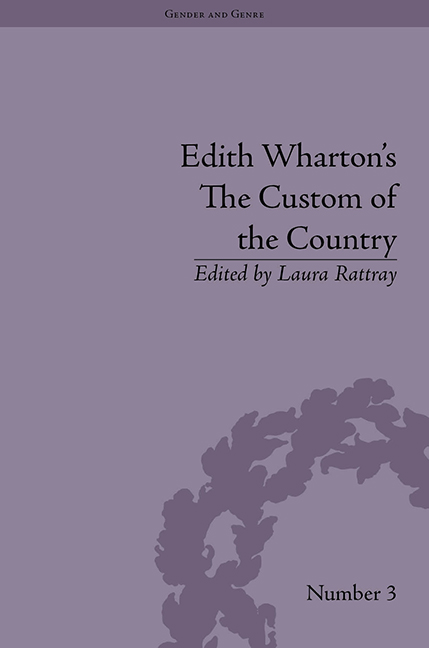Book contents
- Frontmatter
- CONTENTS
- Acknowledgements
- Editorial Note
- List of Contributors
- List of Figures
- Introduction
- 1 The Custom of the Country: Edith Wharton's Conversation with the Atlantic Monthly
- 2 When the Reading Had to Stop: Readers, Reading and the Circulation of Texts in The Custom of the Country
- 3 ‘Don't Cry – it ain't that Kind of a Story’: Wharton's Business of Fiction, 1908–12
- 4 Worst Parents Ever: Cultures of Childhood in The Custom of the Country
- 5 Crude Ascending the Staircase: Undine Spragg and the Armory Show
- 6 ‘It's Better to Watch’: Compulsive Voyeurism in The Custom of the Country and The House of Mirth
- 7 A ‘Mist of Opopanax’: Mapping the Scentscape of The Custom of the Country
- 8 Landscape with the Fall of Undine
- 9 Girls from the Provinces: Wharton's Undine Spragg and Cather's Thea Kronborg
- 10 Men at Work in The Custom of the Country
- 11 ‘Lost in Translation’: Financial Plots and the Modernist Reader in The Custom of the Country
- Notes
- Index
4 - Worst Parents Ever: Cultures of Childhood in The Custom of the Country
- Frontmatter
- CONTENTS
- Acknowledgements
- Editorial Note
- List of Contributors
- List of Figures
- Introduction
- 1 The Custom of the Country: Edith Wharton's Conversation with the Atlantic Monthly
- 2 When the Reading Had to Stop: Readers, Reading and the Circulation of Texts in The Custom of the Country
- 3 ‘Don't Cry – it ain't that Kind of a Story’: Wharton's Business of Fiction, 1908–12
- 4 Worst Parents Ever: Cultures of Childhood in The Custom of the Country
- 5 Crude Ascending the Staircase: Undine Spragg and the Armory Show
- 6 ‘It's Better to Watch’: Compulsive Voyeurism in The Custom of the Country and The House of Mirth
- 7 A ‘Mist of Opopanax’: Mapping the Scentscape of The Custom of the Country
- 8 Landscape with the Fall of Undine
- 9 Girls from the Provinces: Wharton's Undine Spragg and Cather's Thea Kronborg
- 10 Men at Work in The Custom of the Country
- 11 ‘Lost in Translation’: Financial Plots and the Modernist Reader in The Custom of the Country
- Notes
- Index
Summary
Edith Wharton's twenty-eight-year marriage produced no biological children, but she had a lifelong interest in the welfare of the young and created many fictional juvenile portraits. Children are the explicit focus of her short story ‘The Mission of Jane’ (1902), and her novels Summer (1917) and The Children (1928), but Wharton's explorations of child-rearing also appear in novels about women climbing the social ladder. Nowhere are the effects of parenting on childhood more evident than in The Custom of the Country.
The Custom of the Country is set in the early 1900s and published in 1913, and is in some ways a companion novel to The House of Mirth, set in the same period and published in 1905. Both novels of manners tell the story of poorly parented, beautiful and vain women in search of husbands. Both protagonists are essentially, even tragically, ignorant about the true source of happiness. However, Undine Spragg seizes every opportunity for success and is driven by a rapacious appetite for new experiences, money and social standing, in contrast to the more passive Lily Bart, who sows the seeds of success but fails to reap the harvest from her efforts. Beginning with the early reviews, readers have noted the novels' parallel depictions of American womanhood, but they have neglected a key aspect in Lily's and Undine's situations: their families.
- Type
- Chapter
- Information
- Edith Wharton's The Custom of the CountryA Reassessment, pp. 59 - 70Publisher: Pickering & ChattoFirst published in: 2014



